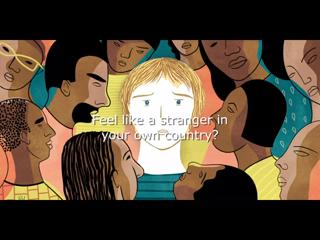Social scientist Robert Putnam, probably best known for his work “Bowling Alone,” on the decline of civic engagement, wanted to know does diversity have an impact on our sense of community? His recent finding suggest that diversity might not make us stronger. In fact, it might just be the opposite. It might make us less… Continue reading Problems with Diversity Part 10
Tag: meritocracy
Problems with Diversity Part 9
A total of 40% of people do not agree that diversity benefits British culture, according to one of the broadest pieces of research examining attitudes to immigration. Members of the public involved in the study were also worried over resources and the local impact of immigrants on their communities, with 52% saying immigrants placed public… Continue reading Problems with Diversity Part 9
Problems with Diversity Part 8
As much as people would like to believe that diversity is always good, it is simply not true. There are two easy answers to this question, and both are intuitively as well as empiracally true. First, diverse groups tend to take more time to set goals, plan, achieve consensus, and gather resources toward accomplishing a… Continue reading Problems with Diversity Part 8
Problems with Diversity Part 7
The Harvard political scientist Robert Putnam has a new study which comes from a survey Putnam directed among residents in 41 US communities, including Boston. Residents were sorted into the four principal categories used by the US Census: black, white, Hispanic, and Asian. They were asked how much they trusted their neighbors and those of… Continue reading Problems with Diversity Part 7
Problems with Diversity Part 6
It has become increasingly popular to speak of racial and ethnic diversity as a civic strength. From multicultural festivals to pronouncements from political leaders, the message is the same: our differences make us stronger. But a massive new study, based on detailed interviews of nearly 30,000 people across America, has concluded just the opposite. Harvard… Continue reading Problems with Diversity Part 6
Problems with Diversity Part 5
Make no mistake: Whether prosaically defined as affirmative action or disguised by the powdered and perfumed sophistry of supposedly “holistic” admissions practices (where, it is claimed, race is “only one of many factors” considered), “diversity” is discrimination based on race and ethnicity. Whether in admissions or hiring, its purpose and effect is the selection of… Continue reading Problems with Diversity Part 5
Problems with Diversity Part 4
A diverse society is by definition, a society that has a range of different things. How important is it? Not nearly as important as a society of competency. A society of competency could specialize in just a few areas but be extremely capable in those areas and be incredibly productive. It would export the products… Continue reading Problems with Diversity Part 4
Problems with Diversity Part 3
Companies promote diversity in the workplace as a moral imperative with “bottom line benefits.” But research on the value of diversity is mixed. Some studies have found diverse teams—meaning workgroups comprised of employees of different races, genders, and backgrounds—promote creativity, nurture critical thinking, and tend to make better, more thoughtful decisions because they consider a… Continue reading Problems with Diversity Part 3
Problems with Diversity Part 1
“Does Microsoft have any plans to end the current policy that financially incentivizes discriminatory hiring practices?” This question, posted by a female engineer on an internal Microsoft message board, was not a complaint about the fact the company is 73% male, or that black and Latin American employees make up just 10% of the US… Continue reading Problems with Diversity Part 1








